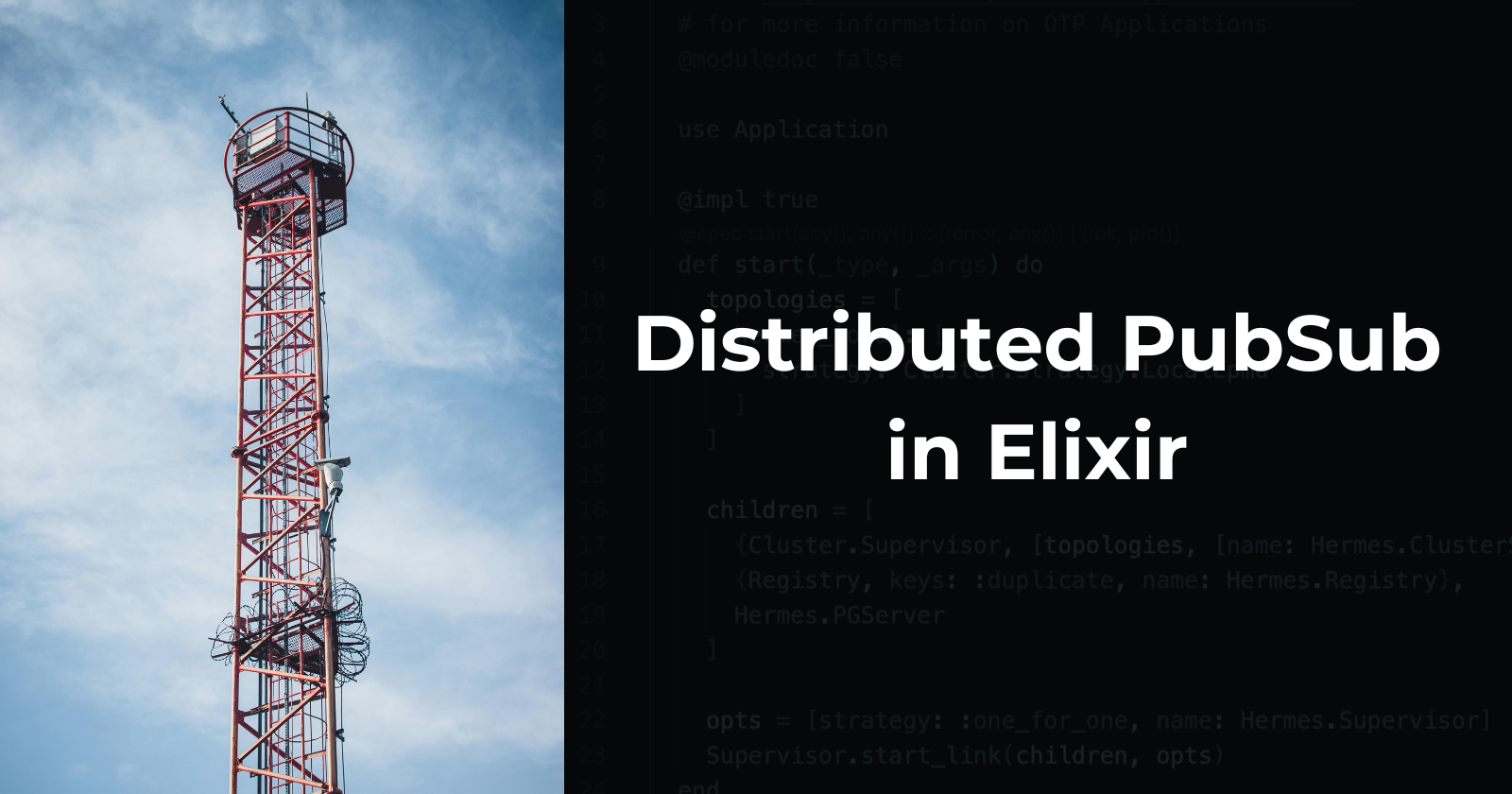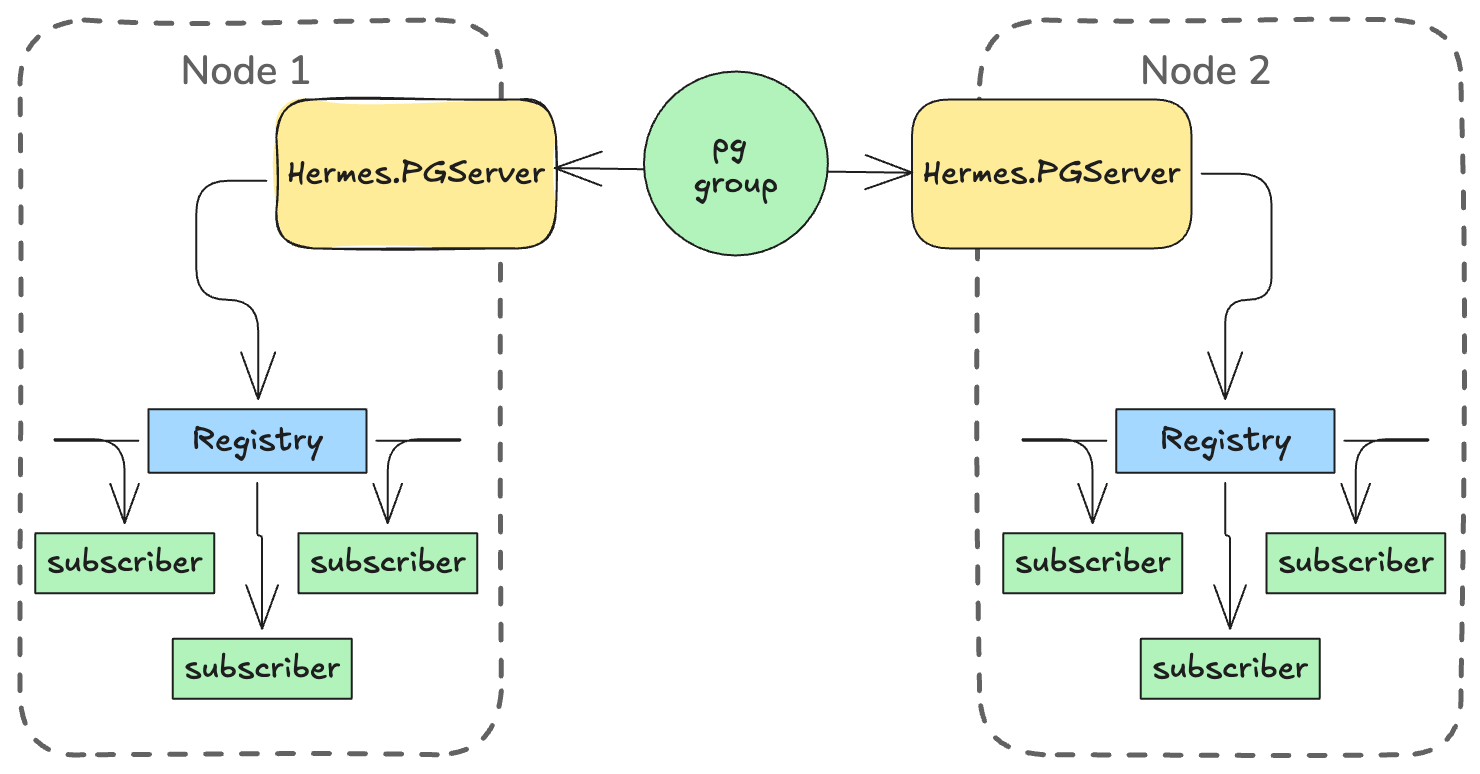Distributed PubSub in Elixir
 Vince Urag
Vince UragTable of contents

In this article, we’ll be exploring on building a distributed PubSub in Elixir. First, we’ll be building a local PubSub which will allow a process to broadcast a message to all local subscribers. Then, we’ll see how we can make it work on a distributed environment, taking inspiration from the battle-tested Phoenix.PubSub — which you should definitely use if you’re planning to use PubSub in your production app. We’ll be using concepts like Registry, Process Groups, Clusters, etc.
What is PubSub?
PubSub (Publish/Subscribe) is a design pattern used for asynchronous communication between services. Instead of a process sending a message directly to another process, the publisher broadcasts a message with a topic and let susbcribers of that topic consume the message. This allows us to build loosely coupled services. To visualize this, let’s take a look at a real-world example, radio stations.
In this example, a radio station is considered a publisher. It broadcasts music, podcasts, or whatever through its assigned frequency. When we want to listen to a banger music, we tune in to our favorite radio station’s frequency. The radio station is not directly playing the music to us. It’s just publishing (broadcasting) to its assigned frequency, and us, being avid listeners, are subscribed (tuned in) to that frequency.
Local PubSub
Now, let us build our local PubSub. In this article, we’ll be naming our PubSub system Hermes, for obvious reasons.
mix new hermes --sup
In a PubSub pattern, we need a mechanism where we could determine which processes are subscribed to which topics. In other words, we need to have a key-value storage for our processes. Fortunately, Elixir already provides this under the Registry module.
Registry
Registry is a local key-value process storage. It allows you to register the current process under a given key. To understand it better, let’s play with it.
First, let’s start the Registry process.
iex(1)> Registry.start_link(keys: :duplicate, name: MyPubSub)
{:ok, #PID<0.105.0>}
keys: :duplicate just means that we allow multiple processes to be registered under a single key. This is exactly what we need for a PubSub, one key/topic for multiple processes.
Now, let’s create a bunch of subscribers and register them to our MyPubSub process registry. These processes would be registered under the key/topic, :event_topic. You can use any Elixir term as a topic. Depending on your use case, it’s usually an action that happened. For example, :"user.updated".
iex(2)> for _i <- 1..3 do
...(2)> spawn(fn ->
...(2)> Registry.register(MyPubSub, :event_topic, nil)
...(2)>
...(2)> receive do
...(2)> message ->
...(2)> IO.puts("#{inspect(self())} received: #{inspect(message)}")
...(2)> end
...(2)> end)
...(2)> end
[#PID<0.107.0>, #PID<0.108.0>, #PID<0.109.0>]
Now that we have subscribers, we can try and broadcast a message to them. The Registry module has a function called dispatch/4 which we could definitely use in this scenario. dispatch/4 will iterate over the entries (in our case, subscribers) and do what we asked it to do.
iex(3)> Registry.dispatch(MyPubSub, :event_topic, fn entries ->
...(3)> for {pid, _} <- entries, do: send(pid, {:hello, "world"})
...(3)> end)
:ok
#PID<0.109.0> received: {:hello, "world"}
#PID<0.108.0> received: {:hello, "world"}
#PID<0.107.0> received: {:hello, "world"}
Voila! We were able to broadcast a message to all registered process under the key/topic. We just demoed PubSub in our iex shell. Now let’s make it pretty and put it in our app, Hermes.
We want the Registry to start as soon as we start our app. So let’s put it in our app’s supervisor.
# lib/hermes/application.ex
...
def start(_type, _args) do
children = [
{Registry, keys: :duplicate, name: Hermes.Registry}
]
opts = [strategy: :one_for_one, name: Hermes.Supervisor]
Supervisor.start_link(children, opts)
end
...
Our Hermes module should have two functions, subscribe/1 and publish/2. subscribe/1 will subscribe the process to the topic while publish/2 will broadcast a message to all subscribers of that topic.
# lib/hermes.ex
defmodule Hermes do
@registry Hermes.Registry
def subscribe(topic) do
Registry.register(@registry, topic, nil)
end
def publish(topic, message) do
Registry.dispatch(@registry, topic, fn entries ->
for {pid, _} <- entries, do: send(pid, message)
end)
end
end
Let’s see if our local PubSub still works as expected.
iex -S mix
iex(1)> spawn(fn ->
...(1)> Hermes.subscribe(:"user.updated")
...(1)>
...(1)> receive do
...(1)> message ->
...(1)> IO.puts("#{inspect(self())} received: #{inspect(message)}")
...(1)> end
...(1)> end)
#PID<0.167.0>
iex(2)> Hermes.publish(:"user.updated", {:user, %{id: 1, name: "John"}})
:ok
#PID<0.167.0> received: {:user, %{id: 1, name: "John"}}
Distributed PubSub
Our current version of Hermes is already good enough… but only for single-node apps. This won’t suffice for a clustered app.
To fact-check this, spin up two instances of the app. For easy identification, we’ll just name our nodes Alice and Bob.
# Node: Alice
iex --sname alice -S mix
iex(alice@Zeus)1>
# Node: Bob
➜ iex --sname bob -S mix
iex(bob@Zeus)1>
Connect the two nodes.
# Node: Alice
iex(alice@Zeus)1> Node.connect(:"bob@Zeus")
:ok
Verify that they are connected and then subscribe to the :"user.updated" topic.
# Node: Bob
iex(bob@Zeus)1> Node.list()
[:alice@Zeus]
iex(bob@Zeus)2> Hermes.subscribe(:"user.updated")
{:ok, #PID<0.136.0>}
From Alice’s shell, broadcast a PubSub message.
# Node: Alice
iex(alice@Zeus)2> Hermes.publish(:"user.updated", {:user, %{id: 1, name: "John"}})
:ok
Observe Bob’s shell. You’ll notice that nothing happened. Even though they are connected, they don’t share the registry. Yes, they are connected, but it just means they can send and receive messages from other nodes in the cluster.
Process Groups
This is where Erlang’s pg module would come in. In its simplest definition, it enables processes in the cluster to be a member of a named group, thus the name pg (process group).
Just like how we started using Registry, let’s play with pg on our iex shell. Spin up two nodes and connect them.
# Node: Alice
iex --sname alice
iex(alice@Zeus)1>
# Node: Bob
➜ iex --sname bob
iex(bob@Zeus)1> Node.connect :"alice@Zeus"
true
iex(bob@Zeus)2> Node.list()
[:alice@Zeus]
Just like the Registry, we need to to start a pg process on both nodes before we can group processes.
# Node: Alice
iex(alice@Zeus)1> :pg.start_link()
{:ok, #PID<0.114.0>}
# Node: Bob
iex(bob@Zeus)3> :pg.start_link()
{:ok, #PID<0.116.0>}
Then on Bob’s shell, join a process group called :my_group.
# Node: Bob
iex(bob@Zeus)4> :pg.join(:my_group, self())
:ok
Bob’s iex shell is now part of the :my_group process group. Go back to Alice’s shell and see all the members of the group.
# Node: Alice
iex(alice@Zeus)2> [pid] = :pg.get_members(:my_group)
[#PID<13033.110.0>]
iex(alice@Zeus)3> send(pid, {:hello, "world"})
{:hello, "world"}
# Node: Bob
iex(bob@Zeus)6> flush
{:hello, "world"}
:ok
You will see the group’s member process from the remote node. Using the send/1 function, you’ll be able to send a message to a process on a remote node.
We can use this for our distributed PubSub, right? Every subscriber process on each node can just join a pg group under the same key. Well, yes… but maybe not so efficient? If there are thousands of subscribers on a remote node, then we will be sending thousands of messages to a remote node. Phoenix.PubSub tackled this by having a designated local server process per node that is responsible for broadcasting to its local subscribers, kind of like a message coordinator. Only the local server processes are added in the pg group. So, in our case, if there are 3 nodes running, there will just be 3 members of the process group.

To ease up our life, let’s just use libcluster for clustering.
# mix.exs
...
{:libcluster, "~> 3.4"}
...
Since we are just running our nodes on localhost, we can use the LocalEpmd strategy.
# lib/hermes/application.ex
...
def start(_type, _args) do
...
topologies = [
hermes_local: [
strategy: Cluster.Strategy.LocalEpmd
]
]
children = [
{Cluster.Supervisor, [topologies, [name: Hermes.ClusterSupervisor]]},
{Registry, keys: :duplicate, name: Hermes.Registry}
]
...
end
...
Once you start the app for Alice and Bob, you should see that they are connected automatically.
# Node: Bob
➜ iex --sname bob -S mix
18:30:17.705 [info] [libcluster:hermes_local] connected to :alice@Zeus
Interactive Elixir (1.17.2) - press Ctrl+C to exit (type h() ENTER for help)
iex(bob@Zeus)1> Node.list()
[:alice@Zeus]
Now that they are connected automatically, we can focus on building our distributed PubSub.
Let’s implement our local server process as a GenServer and add it to our app’s supervision tree.
# lib/hermes/pg_server.ex
defmodule Hermes.PGServer do
use GenServer
def start_link(_) do
GenServer.start_link(Hermes.PGServer, [], name: Hermes.PGServer)
end
@impl GenServer
def init(_args) do
:pg.start_link()
:pg.join({:hermes, Hermes.PubSub}, self())
{:ok, []}
end
end
# lib/hermes/application.ex
...
children = [
{Cluster.Supervisor, [topologies, [name: Hermes.ClusterSupervisor]]},
{Registry, keys: :duplicate, name: Hermes.Registry},
Hermes.PGServer
]
...
Upon the GenServer’s initialization, it will also start the pg process on its default scope. Then, it will join the process group called {:hermes, Hermes.PubSub}. A process group’s name can be any Erlang term. Recompile both and verify that both Alice’s and Bob’s pg server are members of the {:hermes, Hermes.PubSub} process group.
# Node: Alice
iex(alice@Zeus)1> :pg.get_members({:hermes, Hermes.PubSub})
[#PID<22764.190.0>, #PID<0.208.0>]
Currently, Hermes.publish/2 broadcasts only to local subscribers. Instead of broadcasting to registry entries, we need it to send messages to all the other nodes’ Hermes.PGServer process, which are members of the {:hermes, Hermes.PubSub} process group. Here’s the updated Hermes.PGServer module:
# lib/hermes.ex
defmodule Hermes do
@registry Hermes.Registry
@pg_group {:hermes, Hermes.PubSub}
def subscribe(topic) do
Registry.register(@registry, topic, nil)
end
def publish(topic, message) do
for pid <- :pg.get_members(@pg_group), node(pid) != node() do
send(pid, {:broadcast_to_local, topic, message})
end
broadcast_local(topic, message)
end
def broadcast_local(topic, message) do
Registry.dispatch(@registry, topic, fn entries ->
for {pid, _} <- entries, do: send(pid, message)
end)
end
end
Hermes.publish/2 will now send a message to all the clustered nodes’ Hermes.PGServer. That module should be broadcasting it to its local subscribers.
# lib/hermes/pg_server.ex
...
@impl GenServer
def handle_info({:broadcast_to_local, topic, message}, state) do
Hermes.broadcast_local(topic, message)
{:noreply, state}
end
...
Once the node’s Hermes.PGServer process receives a message, it should broadcast it locally.
That should be it! You now have a PubSub that could broadcast to remote nodes… a distributed PubSub! 🎉
Before taking it out for a spin, let’s create a very basic client module so we can easily test that our PubSub works. This Client module just starts a GenServer process that subscribes to a specified topic. It will also just print out any messages it receive.
# lib/hermes/support/client.ex
defmodule Client do
use GenServer
def start_link(topic) do
GenServer.start_link(__MODULE__, topic)
end
def init(topic) do
Hermes.subscribe(topic)
{:ok, topic}
end
def handle_info(msg, state) do
IO.puts("Received: #{inspect(msg)}")
{:noreply, state}
end
end
Now that we have it in place, we can start testing it. I’m feeling a bit adventurous today so we’ll be connecting 3 nodes namely, Alice, Bob, and Carol.
# Node: Alice
iex --sname alice -S mix
# Node: Bob
iex --sname bob -S mix
# Node: Carol
iex --sname carol -S mix
Since we have configured libcluster, they should automatically discover and connect to each other.
For this test, we’ll have the following:
Alice:
1 client subscribed to
:"user.created"1 client subscribed to
:"user.updated"
Bob:
5 clients subscribed to
:"user.created"0 clients subscribed to
:"user.updated"
Carol:
0 clients subscribed to
:"user.created"2 clients subscribed to
:"user.updated"
# Node: Alice
iex(alice@Zeus)1> Client.start_link(:"user.created")
{:ok, #PID<0.214.0>}
iex(alice@Zeus)2> Client.start_link(:"user.updated")
{:ok, #PID<0.215.0>}
# Node: Bob
iex(bob@Zeus)1> for _i <- 1..5, do: Client.start_link(:"user.created")
[
ok: #PID<0.201.0>,
ok: #PID<0.202.0>,
ok: #PID<0.203.0>,
ok: #PID<0.204.0>,
ok: #PID<0.205.0>
]
# Node: Carol
iex(carol@Zeus)1> for _i <- 1..2, do: Client.start_link(:"user.updated")
[ok: #PID<0.197.0>, ok: #PID<0.198.0>]
Let’s try publishing a :"user.created" message from Alice.
# Node: Alice
iex(alice@Zeus)3> Hermes.publish(:"user.created", %{name: "Jade"})
:ok
Received: %{name: "Jade"}
# Node: Bob
Received: %{name: "Jade"}
Received: %{name: "Jade"}
Received: %{name: "Jade"}
Received: %{name: "Jade"}
Received: %{name: "Jade"}
# Node: Carol
# ** nothing new **
Since no clients in Carol are interested when users are created, nothing was broadcasted to its local subscribers.
Cool. Now, let’s try publishing a :"user.updated" message from Bob.
# Node: Alice
Received: %{id: 1, name: "Jadyline"}
# Node: Bob
iex(bob@Zeus)2> Hermes.publish(:"user.updated", %{id: 1, name: "Jadyline"})
:ok
# Node: Carol
Received: %{id: 1, name: "Jadyline"}
Received: %{id: 1, name: "Jadyline"}
Awesome! Our distributed PubSub seems to be working fine!
I would like to reiterate that what we built here is a simple toy example solely for learning purposes and not meant to be used in production. If you need a distributed PubSub for production, just use the already battle-tested Phoenix.PubSub.
Link to full source code: https://github.com/vinceurag/hermes
See you on the next one!
Subscribe to my newsletter
Read articles from Vince Urag directly inside your inbox. Subscribe to the newsletter, and don't miss out.
Written by

Vince Urag
Vince Urag
I'm a software engineer with 7+ years experience in backend engineering. My main focus is on distributed systems, concurrency, parallelism, etc. I usually dabble with Elixir/Erlang.